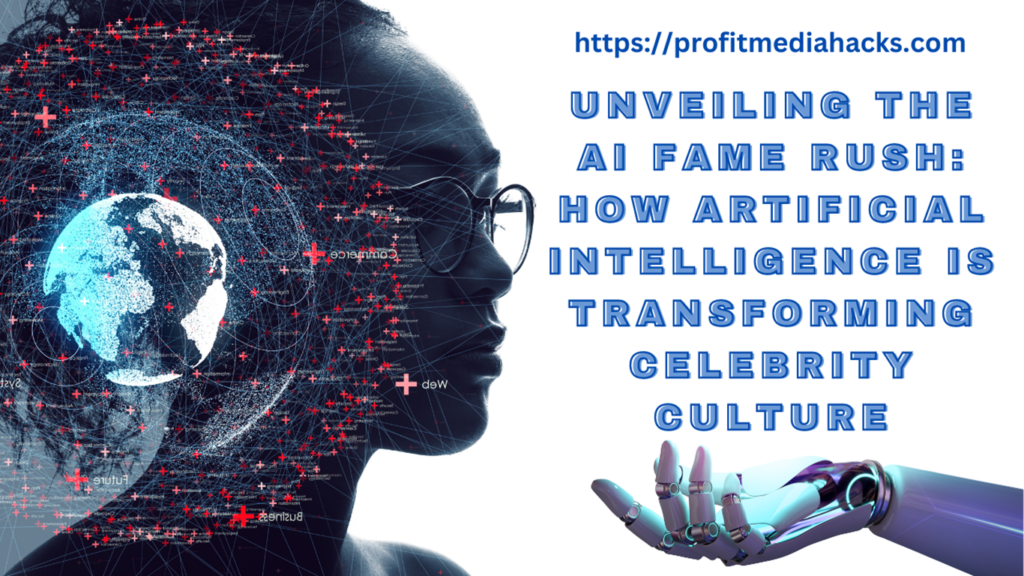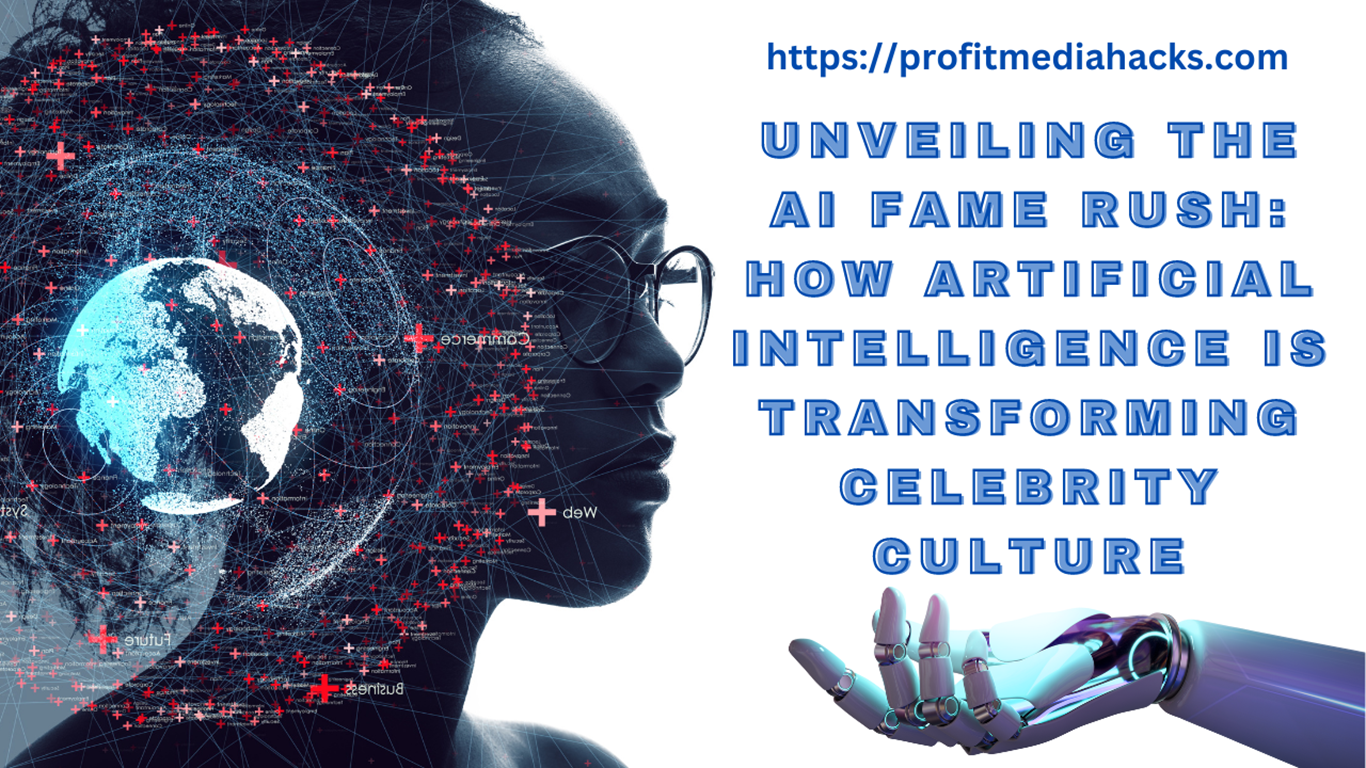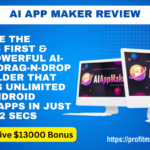The concept of fame has taken on a new dimension with the emergence of artificial intelligence (AI). With algorithms powering social media platforms and virtual personalities gaining traction, the phenomenon of AI Fame Rush is reshaping celebrity culture like never before.
In the era of AI, the traditional definition of celebrity is undergoing a seismic shift. AI Fame Rush refers to the rapid rise of individuals and entities propelled to stardom through the power of artificial intelligence. This article explores the various facets of AI’s influence on celebrity culture and its implications.
Easiest & Proven Way to Make $100 Daily with 0 COST – Watch THIS FREE Training to START >>

The Rise of AI Influencers
The Rise of AI Influencers marks a transformative shift in the realm of digital influence and social media marketing. These AI-powered personas, devoid of physical presence yet brimming with personality, have captivated online audiences worldwide. Enabled by cutting-edge technologies such as natural language processing and deep learning algorithms, AI influencers seamlessly navigate social media platforms, engaging with followers, and endorsing brands.
What sets AI influencers apart is their ability to transcend the limitations of human influencers. They are not bound by fatigue, emotions, or controversies that often plague their human counterparts. Instead, AI influencers operate 24/7, tirelessly churning out content tailored to the preferences of their target audience. Moreover, their virtual nature allows them to embody idealized traits and characteristics, making them aspirational figures for followers seeking perfection.
Despite initial skepticism, AI influencers have proven to be incredibly effective in driving consumer engagement and brand awareness. Their ability to deliver consistent, on-brand messaging resonates with digitally savvy audiences, leading to increased conversion rates and ROI for brands. As technology continues to advance, we can expect AI influencers to become even more sophisticated.
AI in Content Creation
AI in Content Creation heralds a new era of efficiency and innovation in the creative industry. With the advent of advanced algorithms and machine learning models, artificial intelligence has become an indispensable tool for generating a wide range of content across various mediums.
From writing articles and blog posts to composing music and designing graphics, AI is revolutionizing the way content is produced. Natural language processing (NLP) algorithms enable AI to understand human language and generate coherent, contextually relevant text. This capability is particularly useful for content marketers, allowing them to produce high-quality content at scale, optimize for SEO, and tailor messaging to specific target audiences.
Furthermore, AI-driven content creation tools empower creators to experiment with new formats and styles, unleashing their creativity and pushing the boundaries of traditional storytelling. Whether it’s generating personalized product descriptions for e-commerce websites or crafting compelling narratives for brand campaigns, AI streamlines the content creation process, freeing up time for creators to focus on strategy and ideation.
Easiest & Proven Way to Make $100 Daily with 0 COST – Watch THIS FREE Training to START >>
However, the rise of AI in content creation also raises ethical concerns regarding authenticity and originality. As AI becomes more proficient at mimicking human writing styles, distinguishing between AI-generated and human-generated content becomes increasingly challenging. It’s essential for creators and consumers alike to remain vigilant and uphold ethical standards in content creation, ensuring that AI remains a tool for enhancing creativity rather than undermining it.
Virtual Celebrity Identities
Virtual Celebrity Identities epitomize the intersection of technology and entertainment, blurring the lines between reality and simulation. These AI-powered personas, meticulously crafted and curated to resonate with online audiences, have emerged as influential figures in contemporary pop culture.
Unlike traditional celebrities, virtual celebrities exist solely in the digital realm, yet their impact extends far beyond the confines of cyberspace. Leveraging sophisticated algorithms and data analytics, creators engineer virtual personas with distinct personalities, backstories, and aesthetics, tailored to appeal to specific demographics.
Virtual celebrities wield significant influence across various industries, from fashion and beauty to gaming and entertainment. With millions of followers on social media platforms, they command attention and shape consumer behavior, endorsing products and brands with authenticity and authority.
However, the rise of virtual celebrity identities also raises questions about authenticity and transparency. As audiences form emotional connections with these digital avatars, it becomes crucial to maintain transparency about their artificial nature and the humans behind their creation.
Despite these ethical considerations, virtual celebrity identities continue to captivate audiences worldwide, challenging conventional notions of fame and celebrityhood in the digital age. As technology advances and AI becomes more sophisticated, we can expect virtual celebrities to play an increasingly prominent role in shaping cultural narratives and influencing societal trends.
The Role of AI in Social Media Stardom
The Role of AI in Social Media Stardom is a phenomenon that has reshaped the landscape of online influence and digital marketing. Artificial Intelligence (AI) algorithms power the algorithms of major social media platforms, determining what content users see and interact with. This places AI at the forefront of shaping who achieves stardom in the digital realm.
Easiest & Proven Way to Make $100 Daily with 0 COST – Watch THIS FREE Training to START >>
AI plays a pivotal role in understanding user preferences, behaviors, and trends, allowing content creators to tailor their strategies for maximum engagement and visibility. From recommending personalized content to facilitating targeted advertising campaigns, AI enables influencers to amplify their reach and impact on social media platforms.
Moreover, AI-driven analytics provide invaluable insights into audience demographics, sentiment analysis, and content performance, empowering influencers to refine their content strategies and optimize their online presence. Through data-driven decision-making, influencers can identify emerging trends, capitalize on viral moments, and stay ahead of the competition in the ever-evolving social media landscape.
However, the growing reliance on AI in social media stardom also raises concerns about algorithmic bias, filter bubbles, and the commodification of user data. As AI continues to shape the online narrative, it’s essential for influencers and platform developers to prioritize transparency, accountability, and ethical use of AI technologies to ensure a fair and inclusive digital ecosystem.
Ethical Considerations
Ethical Considerations surrounding artificial intelligence (AI) in various fields, including celebrity culture, are paramount in navigating the complexities of this rapidly evolving technological landscape. As AI becomes increasingly integrated into our daily lives, it brings forth a myriad of ethical dilemmas and moral implications that demand thoughtful consideration and responsible action.
One primary concern revolves around the transparency and authenticity of AI-generated content and virtual celebrity identities. As AI continues to advance, there’s a growing risk of misinformation, manipulation, and the proliferation of fake news, posing significant threats to societal trust and integrity.
Moreover, the use of AI in shaping public opinion and influencing consumer behavior raises questions about algorithmic bias and discriminatory practices. AI-driven recommendation systems, if not properly regulated, may reinforce existing inequalities and amplify societal biases, exacerbating issues of discrimination and exclusion.
Additionally, the ethical implications of AI extend to privacy rights, data security, and the protection of personal information. As AI algorithms collect, analyze, and utilize vast amounts of user data, there’s a pressing need for robust data protection regulations and ethical guidelines to safeguard individuals’ privacy and autonomy.
Ultimately, addressing these ethical considerations requires a collaborative effort from policymakers, technologists, ethicists, and society at large. By promoting transparency, accountability, and ethical use of AI technologies, we can harness the transformative potential of AI while upholding fundamental principles of fairness, justice, and human dignity.
Future Trends
Looking ahead, the future of AI in celebrity culture is ripe with possibilities and uncertainties. As technology continues to evolve, we can expect to see more sophisticated AI influencers, immersive virtual experiences, and personalized content tailored to individual preferences. However, ethical considerations and regulatory challenges may temper the unchecked expansion of AI in the public sphere.
Conclusion
The AI Fame Rush represents a paradigm shift in the way we perceive and engage with fame in the digital age. As artificial intelligence continues to permeate every aspect of our lives, it behooves us to critically examine its impact on celebrity culture and society at large. By fostering transparency, accountability, and empathy, we can harness the power of AI to create a more equitable and inclusive digital landscape.
FAQs
Are AI influencers replacing human celebrities?
While AI influencers are gaining popularity, human celebrities continue to hold sway in traditional media and entertainment industries.
How do AI-generated personas affect brand endorsements?
Brands are increasingly collaborating with virtual celebrities to reach niche audiences and experiment with innovative marketing strategies.
What are the risks of AI-generated content?
AI-generated content may perpetuate stereotypes, misinformation, and propaganda if not properly regulated and scrutinized.
Can virtual celebrities have genuine interactions with their audience?
Despite their artificial nature, virtual celebrities can engage with their audience authentically through scripted interactions and personalized content.
What steps can be taken to address ethical concerns surrounding AI in celebrity culture?
Implementing transparency measures, promoting digital literacy, and advocating for regulatory oversight are essential to mitigate the ethical risks associated with AI in celebrity culture.
Easiest & Proven Way to Make $100 Daily with 0 COST – Watch THIS FREE Training to START >>
Thanks for reading my article on “Unveiling the AI Fame Rush: How Artificial Intelligence is Transforming Celebrity Culture!”” I hope it will help!













